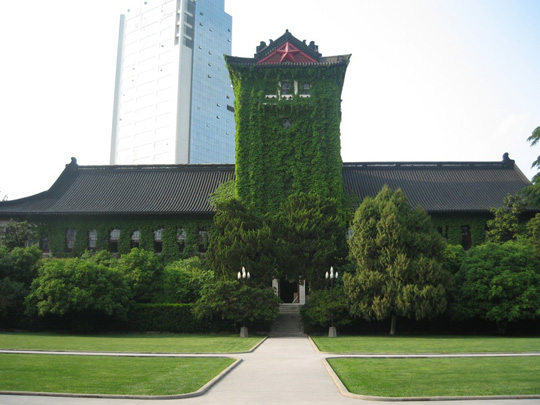Partnership with potential
Freiburg, Jul 26, 2017
An international partner who we can exchange people and ideas with in many areas; who supports applications for funding programs; and with whom we can conduct joint research and teaching in core subjects: The University of Freiburg has maintained a key partnership with the University of Nagoya, Japan, since 2010 and also has key partnerships with Pennsylvania State University in the US, and Université de Strasbourg in France. Claudia Füssler presents these partnerships in a series. This month: Nanjing University in China.
 The still-young key partnership with Nanjing University promises collaboration in many subjects. Photo: Nemetz33/Flickr
The still-young key partnership with Nanjing University promises collaboration in many subjects. Photo: Nemetz33/Flickr
Our key partnership with the University of Nanjing is a relatively new one. An initial agreement for multidisciplinary exchanges was struck as early as 1999, however closer cooperation did not develop until a few years later. In 2009 the University of Freiburg, the University of Nanjing, and the city of Freiburg became partners in the new Confucius Institute in Freiburg, which is now part of the University of Freiburg's Chinese language studies program. "In 2016 we expanded our collaboration with a joint Center for Modern China Studies," says Katharina Aly, head of the University's International Office.
That has a broader basis and also deals with contemporary history and society in today's China. Alongside an exchange program, many doctoral candidate from Freiburg are traveling to Nanjing and vice versa. There are also joint research interests. Initial cooperation is taking place in Philosophy, Law, Chemistry, and Biophysics. "It is all still early days and we are still working on a lot of it. But it is certainly a partnership with potential," says Aly.
History and remembrance
The expansion of the collaboration started at the Institute of Chinese Studies, where Nicola Spakowski is a professor. The common ground for research will be recent history and remembering it. Various aspects of this were discusses at a workshop held last year. "We have three doctoral candidates from Nanjing in Freiburg, all of them from History. They are highly educated and make a great contribution," says Spakowski. The academic staff are also taking part in the exchange. Spakowsi herself offered a four-week seminar in Nanjing for Master's students in Sociology two years ago. "That gave me a valuable insight into the university system, the training, and the ideas and attitudes of the students toward their own society."
A student on this course who was particularly outstanding, got a scholarship from the University of Freiburg for a semester and made use of the opportunity in winter semester 2016-17 to get to know the German system. "For us, the key partnership presents an opportunity to bring together two great university traditions in direct exchange and to learn from one another with mutual respect," Spakowski says.
Joint training for doctoral candidates
The second pillar of the German-Chinese collaboration is in Materials Science. The first delicate ties have been made, but Chris Eberl, Professor of Materials Mechanics at the Department of Microsystems Engineering, says "we are are still finding out about each other's specialist areas and how they may fit together." Freiburg researchers and their Chinese colleagues have a lot to share in the area of high-perfomance materials.
"While we deal with the mechanics of metamaterials, the researchers at the University of Nanjing are looking at the optics of metamaterials, which is an important complement to our work." These internally very precisely structured materials will make it possible in the future to program the characteristics and functions of materials," Eberl explains. In the next few months the researchers would like to put up structures for joint doctoral training.

